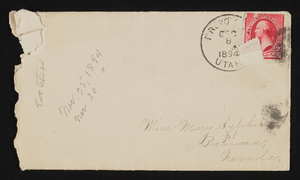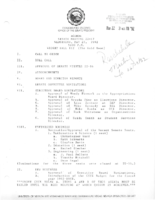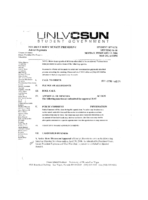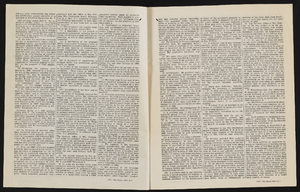Search the Special Collections and Archives Portal
Search Results
Joyce Helens and Sonja Sibert (Great Basin College) oral history interview conducted by Magdalena Martinez and Elia Del Carmen Solano-Patricio: transcript
Date
Archival Collection
Description
From the Lincy Institute "Perspectives from the COVID-19 Pandemic" Oral History Project (MS-01178) -- Education sector interviews file.
Text
Wilson Family Papers
Identifier
Abstract
The Wilson Family Papers (1875-1918) document the personal and professional lives of James B. Wilson Sr., James B. Wilson Jr., and George Twison "Tweed" Wilson, early pioneers in Southern Nevada. The collection is comprised of personal correspondence, invoices and advertisements from the Wilson family business, the Sandstone Ranch, and photographs of the extended Wilson family.
Archival Collection
Strutt Hurley Collection on the Southern Nevada Association of Pride, Inc. (SNAPI) and Las Vegas Gay Pride
Identifier
Abstract
The Strutt Hurley Collection on the Southern Nevada Pride Association, Inc. (SNAPI) and Las Vegas Pride (1989-2000) contains materials collected and produced by Strutt Hurley during her tenure as Director of Entertainment of SNAPI. Materials include meeting minutes, advertising contracts, Las Vegas Pride programs, and ephemera collected from Pride celebrations in Las Vegas, Nevada and other parts of the United States and the world.
Archival Collection
Alpha Kappa Alpha Sorority, Incorporated, Theta Theta Omega Chapter Records
Identifier
Abstract
The Alpha Kappa Alpha Sorority, Incorporated, Theta Theta Omega (AKA TTO) Chapter records (1965-2020) are comprised of organizational records, conference programs, digitized copies of the chapter's scrapbooks, and copies of
Archival Collection

Letter and envelope from Annie Ronnow, Provo, Utah. to Mary Etta Syphus, Panaca, Nevada
Date
Archival Collection
Description
From the Syphus-Bunker Papers (MS-00169). The folder contains an original handwritten letter, an envelope, a typed transcription of the same letter, and a copy of original letter attached.
Text

Meeting minutes for Consolidated Student Senate University of Nevada, Las Vegas, May 27, 1992
Date
Archival Collection
Description
Text

Meeting minutes for Consolidated Student Senate, University of Nevada, Las Vegas, February 13, 2006
Date
Archival Collection
Description
Text

Transcript of interview with Paul Senzaki, Alan Hess, and Charlie White III by Stefani Evans and Claytee White, September 9, 2016
Date
Archival Collection
Description
Architect Paul Senzaki, and artist-illustrator Charlie White III recall their experiences of working in Las Vegas: Paul on Treasure Island, The Palms, Fremont Street Experience, and World Market Center and Charlie on Treasure Island and its successor, TI; New York New York. Architectural historian Alan Hess, who is an expert on Las Vegas architecture, offers historical context and asks pertinent questions. While this interview touches on several iconic Las Vegas buildings, the conversation mostly details why and how Steve Wynn's Treasure Island involved the labors of artists, illustrators, art directors, and designers of stage and screen as well as the those of architects, contractors, planners, and subcontractors.
Text

Transcript of interview with Joanna S. Kishner by Barbara Tabach, January 10, 2017
Date
Archival Collection
Description
Joanna Kishner epitomizes the native Southern Nevada who was raised in both a Jewish and secular world of Las Vegas. A daughter of Ellen Neafsey Jobes and Irwin Kishner, she was born in 1964 and graduated from Clark High School in 1982. As she recalls, the halls of Clark High School witnessed a stellar cast of characters in the early 1980s, from future casino executives, to additional judges, to comedian Jimmy Kimmel. Judge Kishner earned a double major in Political Science and Psychology from Claremont McKenna College (1986) and graduated from UCLA School of Law (1989.) She remained in California and worked as senior counsel for Warner Brothers, a division of Time-Warner Entertainment Company and was also an associate with the multi-national firm Paul Hastings Janofsky & Walker. In time, she felt the tug to return to her childhood roots in Las Vegas. She and her husband were married at Temple Beth Sholom, where she had her bat mitzvah and raises her own children in the Jewish tradition. Judge Kishner has been recognized for her legal work throughout the years, this includes pro bono work for disadvantaged children through the Children’s Attorney Project. When she set her sights on becoming a judge, she was joined by her young family as she knocked on thousands of doors to introduce herself and her passion for justice. In 2010, she was elected to Department XXXI of the Eighth Judicial District.
Text

